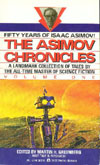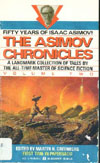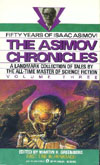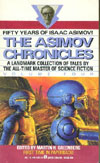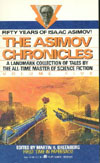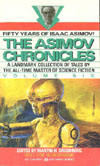Isaac Asimov is one of the most popular writers in the history of science fiction. He has fascinated and entertained millions of readers for half a century. The Asimov Chronicles celebrates that half-century with fifty of his most enthralling stories, one from each year. Here are tales of distant worlds, parallel universes, unknowable aliens and immeasurable space; and in this giant collection you will also find classics such as Nightfall, The Martian Way, and The Ugly Little Boy.
The Asimov Chronicles is a must for any reader who wishes to share the vision and imagination of one of science fiction’s legendary greats
This is an odd little book. Actually, it’s not so little—it runs to some 600 pages in the hardback edition and is spread out over six rather slim volumes in paperback. It consists of one short item for each of the first fifty years of Asimov’s writing career, as gathered by the indefatigable Martin H. Greenberg.
This organization works both for and against the volume. On the one hand, it means that much of Asimov’s best work gets included: “Nightfall,” “The Last Question,” “The Ugly Little Boy,” “The Bicentennial Man,” “The Martian Way,” and so on. On the other hand, if there is more than one really good short work published in a given year, the lesser work yields to the greater and so there’s an awful lot of Asimov’s best work which is not included: “The Dead Past,” “Galley Slave,” “Reason,” and so on.
In particular, Greenberg follows the classification of the early Foundation stories as parts of novels, rather than as short fiction in their own right, and so stories like “The Mule” are left out.
Moreover, since the collection consists of Asimov’s best from any given year, that means that there are few clunkers. But there are some. As Asimov’s fiction output declined, there were fewer stories to choose from and so—even if his average quality remained the same, which some would dispute—we are forced to sit through distinctly lesser works such as “True Love,” “Lest We Remember,” and “Exile to Hell.” (As it happens, this would tend to provide evidence for those who feel Asimov’s writing skills declined with age.) In fact, for much of the 1960’s and 1970’s, Asimov’s fiction output is so slight that various essays are included to have something to put in.
The result is a decidedly uneven volume. A book this size which consisted of Asimov’s best would be a marvelous book indeed, but there’s too much left out here and too much low-quality material put in to make it really worthwhile.
Contents
